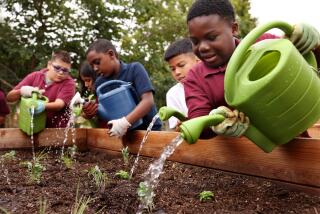Gardeners Grow Upset Over Loss of School Site
- Share via
Tom Conyers studies the robust tangle of leafy brambles climbing their supports in his small garden plot, their white flowers starting to give way to tiny green berries.
He does a quick calculation with his practiced gardener’s eye. Forty-five days, he estimates, and he’ll have the first crop from the two small bare-root canes he planted last spring.
“If we last that long,” he said.
For more than 25 years, the Manhattan Beach Unified School District has played host to gardeners at 80 plots carved from an unused strip of land next to the athletic fields at the edge of Mira Costa High School. At the Manhattan Beach Community Garden (open to all ages) and the adjacent Pea Patch, reserved for people over 55, friendships have grown along with the poppies and sweet peas, the broccoli and lettuce.
Now the school district is facing budget problems and has decided to sell the land. District officials believe the narrow garden site, covering less than an acre, will fetch about $1.6 million as lots for three houses.
The gardeners must be out by May 31, the district announced, in a Feb. 22 letter to the organization’s president and in eviction notices on the gardens’ chain-link fence.
“We’re grateful for the time we’ve had here, but we were hoping we would be given more notice so we could have a chance to raise the money to buy the land or at least to find another place,” said Ann Barklow, a community gardener and maintenance director of the Manhattan Beach Botanical Garden, which also sits on school district land.
“I’m witnessing what this has done to our seniors, and they are just at such a low now. This has taken away so much from them, and I just wish there was some way we could work with the school district and find a balance between the needs of the students and the needs of the seniors,” Barklow said.
Scott Smith, deputy superintendent of business for the school district, called the gardens “a worthwhile cause,” but said the district’s top priority is serving its 6,000 students.
“It’s really a choice of utilizing our assets to prevent program and budget cuts that affect our own kids versus having a nice area for the seniors to garden in,” he said. “We understand that they like it, but our kids have to come first.”
Smith said the district does not yet have a buyer, although it has had inquiries from developers. He said the district turned down the gardeners’ request for a deadline extension because it needs time to “get in there and make it more marketable” by clearing the gardens.
“We’d be tickled to death if they could find a guardian angel or a philanthropy group” that could buy the land, Smith said. “Our goal is not to stop the gardens; it’s to increase funding for our students.”
Noting that the state, which provides most of the funding for public schools, has recently made cuts in public education, Smith said the request for an extension as long as two years is not feasible.
The gardeners, many of whom spent a year or more on a waiting list for plots, are scrambling as eviction looms. They have been unable to find land elsewhere in the heavily developed and increasingly expensive beach communities, where most have lived for many years.
They are appealing for help from the Manhattan Beach City Council, their state and county elected officials and charitable organizations.
They have touted their ideas not only for continuing gardening lessons and tours but also for expanding the gardens’ reach and benefits. Those ideas include raising vegetables for the needy and installing raised beds to accommodate those in wheelchairs.
Barklow’s letter to the Beach Cities Health District, which funds numerous health and wellness programs in Hermosa Beach, Manhattan Beach and Redondo Beach, caught the attention of health district board member Joanne Woodward, who invited the gardeners to make their pitch at last week’s board meeting.
“I hate to see all the good work they have been doing go to waste,” said Woodward. “I don’t know if we can do anything to help them, but I would sure like to try.”
But the gardeners know they face long odds, and some have been reluctant to plant spring crops. A few plots have been allowed to wither, the last of the winter vegetables giving way to weeds. Others soldier on, feeding and watering their artichokes, spinach and string beans and debating whether they should plant tomatoes.
Robert Webb, a commercial beekeeper who grows kohlrabi and other crops in his plot, minces no words about the looming eviction.
“I am more than angry,” Webb said, working the garden as the sun burned through the morning fog.
“The seniors have been giving to the community and the schools over the years, and we deserve to have something given back. All we hear is ‘the kids, the kids.’ Seniors matter, too,” Webb said.
Retiree Rudy Weaver credits his gardening with helping him keep healthy and active. He took a long look at the plots bursting with flowers and vegetables, at the miniature windmills installed to scare off gophers, at his fellow gardeners watering and digging.
“I don’t think we’re going to save this place,” Weaver said slowly, “but I sure hope we do.”







